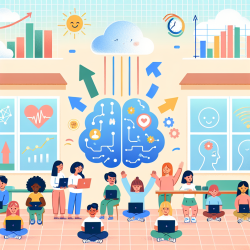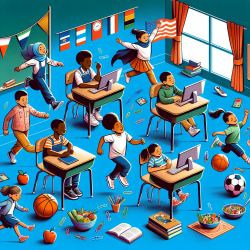Introduction
As practitioners dedicated to the well-being of children, it is crucial to stay informed about the latest research and how it can be applied to improve outcomes. The study titled "Associations between Self-Determined Motivation, Accelerometer-Determined Physical Activity, and Quality of Life in Chinese College Students" provides valuable insights that can be leveraged to enhance children's physical activity (PA) and quality of life (QoL). This blog will explore how these findings can be applied to foster better outcomes in educational settings, particularly through online therapy services like those offered by TinyEYE.
Understanding the Research
The study investigated the relationships among self-determined motivation, PA, and QoL in Chinese college students. It found that perceived competence and social support are critical for improving PA and QoL. Specifically, perceived competence negatively predicted problems with physical function and depression, while controlled motivation was linked to social participation. These insights highlight the importance of fostering self-determined motivation to enhance well-being.
Applying the Findings in Practice
As practitioners, we can draw several actionable strategies from this research:
- Enhance Perceived Competence: Encourage children to set achievable goals and celebrate their successes. This can be integrated into online therapy sessions by using interactive tools that allow children to track their progress.
- Foster Social Support: Engage parents and peers in the therapy process. Online platforms can facilitate group sessions or parent-child activities that reinforce social support.
- Promote Autonomous Motivation: Design activities that children find enjoyable and meaningful. This can include gamified exercises that align with their interests, making PA a rewarding experience.
Encouraging Further Research
While the study provides a solid foundation, further research is needed to explore these relationships in different cultural contexts and age groups. Practitioners are encouraged to contribute to this body of knowledge by conducting studies within their own settings. This could involve tracking the impact of motivational strategies on children's PA and QoL over time.
Conclusion
By applying the insights from this study, practitioners can enhance the effectiveness of their interventions and contribute to better outcomes for children. The integration of self-determined motivation strategies into online therapy can lead to more engaged and healthier children. For those interested in delving deeper into the research, the original study can be accessed here.










